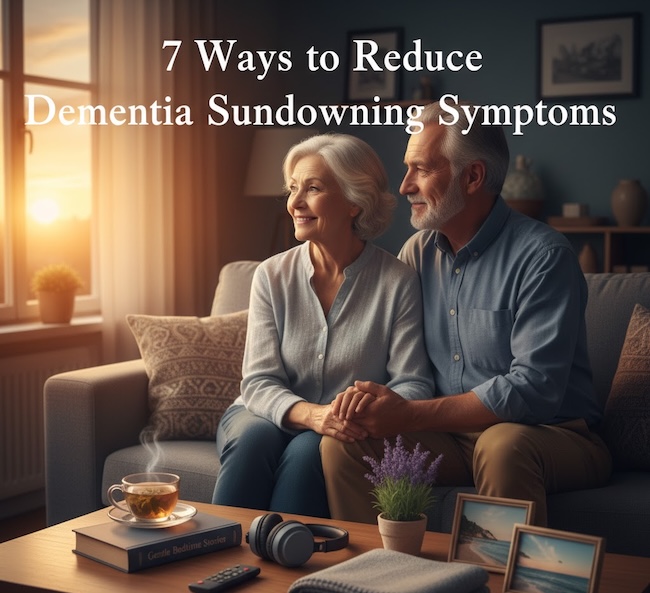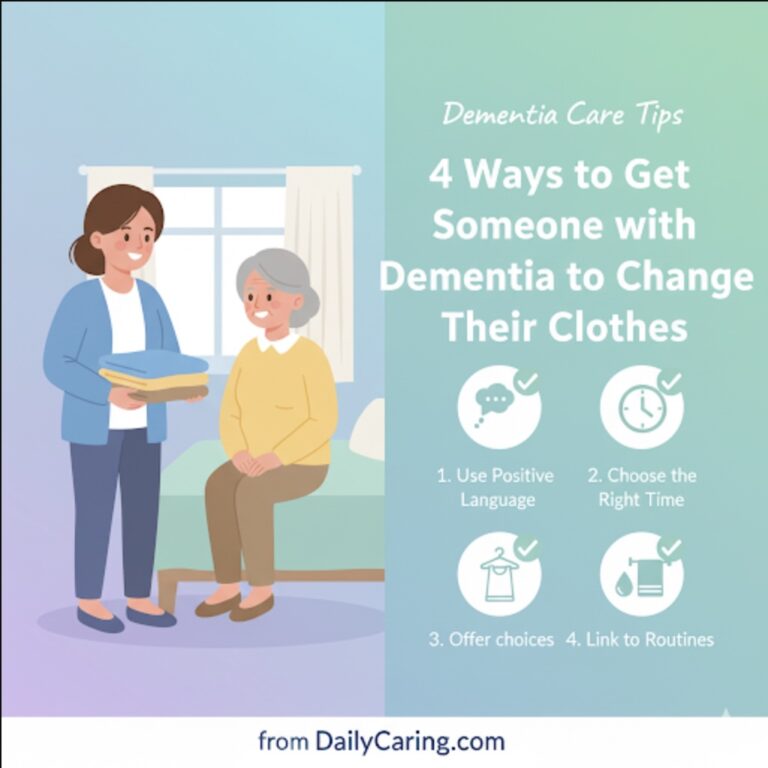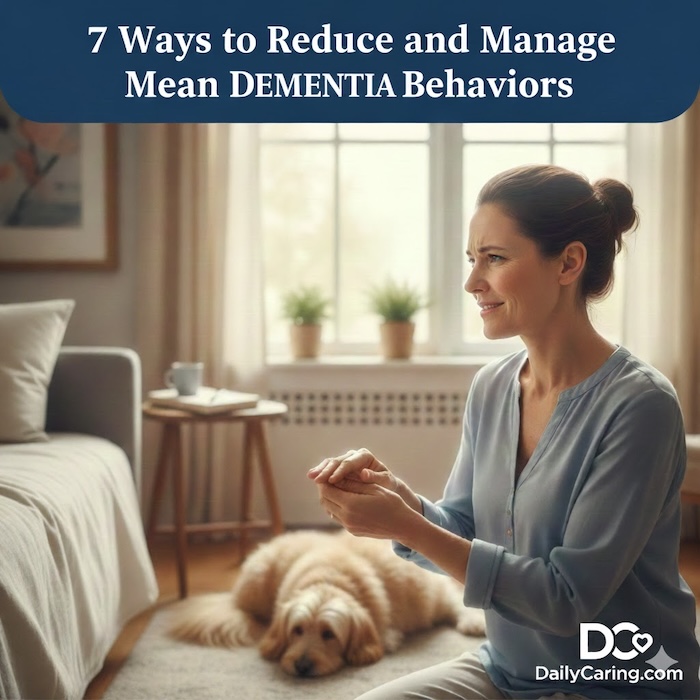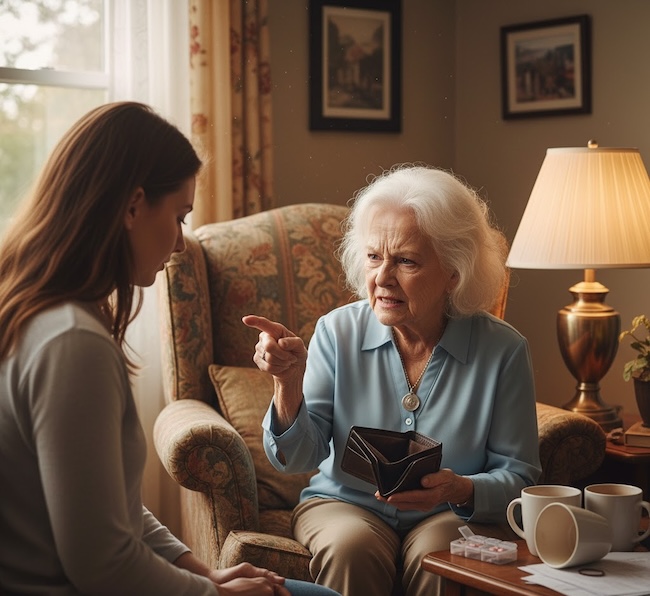As daylight softens and evening approaches, you might notice a troubling shift in an older adult living with dementia. Restlessness, confusion, or agitation can replace the day's relative calm—a phenomenon known as sundowning.
This transition can be one of the most challenging parts of the day, leaving you feeling helpless and searching for answers. But what if you could transform these difficult hours into a more peaceful time for everyone?

The good news is that with a few thoughtful strategies, you can. Here are seven practical ways to reduce sundowning symptoms and restore a sense of calm to your evening routine.
Many people with Alzheimer's disease or dementia get increasingly confused, anxious, and agitated later in the day. Others may have disrupted sleep schedules or restlessness at night.
These sundowning symptoms are disruptive and challenging to manage. They’re also stressful and negatively affect your loved one's quality of life.
What is Sundowning and What Causes It?
Sundowning is a phenomenon where individuals with dementia or other cognitive impairments experience increased confusion, agitation, and other behavioral changes in the late afternoon or evening. It's also known as “sundown syndrome,” interestingly enough.
This behavior tends to happen in the late afternoon or evening, which is why it's often called “sundowning.”
Some studies say that sundowning affects up to 20% of people with Alzheimer’s. And, it can also affect older people who don’t have dementia.
Scientists don’t know precisely why sundowning occurs, but they think changes in the brain cause it.
Their body clock, which regulates when we’re awake and when we’re asleep, might be affected by these changes.
What are the Top Sundowning Symptoms
A Loved One Might Feel:
- Agitated, upset, or anxious
- Confused or disoriented
- Restless
- Irritable or demanding
- Suspicious
They might show it by:
- Getting angry or yelling
- Pacing the room
- Seeing or hearing things that aren’t there
- Having mood swings
VIDEO: How to Reduce Sundowning Symptoms in Seniors
7 ways to Reduce and Manage Sundowning Symptoms
1. Track behavior and look for patterns
To reduce sundowning behavior, the first step is to identify your loved one's biggest triggers—the things most likely to upset or agitate them.
Use a caregiving notebook to track their behavior and activities.
Write down your loved one's daily routine and any symptoms you notice. Please pay special attention in the few hours before their sundowning usually starts.
After a few days, you’ll be able to spot clues that tell you which activities, environments, or needs are triggering their behavior or making symptoms worse.
Knowing their triggers helps you avoid or minimize them.
2. Make Sure Basic Needs are Taken Care Of
One or two hours before their symptoms usually start, check to make sure their basic needs are met.
Don’t wait for them to ask – they may not be aware of their needs or able to express them adequately.
Sundowning is more likely to happen when someone is:
- End-of-day exhaustion (mental and physical)
- Feeling pain or discomfort
- In need of the toilet
- Hungry or thirsty
- Bored
- Depressed
- Too hot or cold
- Having trouble sleeping
For example, you could make sure they eat a snack and drink some water at 2:30 pm, use the toilet every hour or two starting at 3 pm, or time their pain medication so it kicks in by 4 or 5 pm.
3. Minimize Noise, Distractions, and Shadows
Helping an older adult feel calm and safe will reduce sundowning behavior that’s triggered by overstimulation or fear.
As daylight fades, shadows or dim lighting can play tricks on their eyes and minds, causing fear or anxiety.
Increase feelings of safety by closing curtains and blinds before sunset so they won’t see reflections or shadows from outside. Turn on plenty of lights to eliminate scary shadows or dark corners.
It’s also essential to keep them calm by limiting noise and distractions.
For example, turn off the TV, lower the music volume, and don’t have visitors over. This is also a time to avoid activities that might upset or tire you, like bathing.
If there are others in the house, move the children to another room and ask people to be very quiet. Also, avoid noisy chores like vacuuming.
4. Be Mindful of Your Own Stress Level
After a long day, you might be frustrated, cranky, and exhausted by afternoon (it’s only natural!).
Even if it’s not apparent, people with dementia may be able to sense it. They’re often more sensitive to body language and tone of voice.
Picking up on your stress could cause your older adult to become “sympathetically” stressed, leading to an increase in agitation and anxiety.
To reduce your own stress, try coping tips like taking mini-breaks during the day, getting regular help, or taking a 2-minute stress-relief break 30 minutes before your symptoms usually start. (Get more stress relief tips here.)
5. Establish a Daily Routine
Sticking to a regular daily routine reduces stress, increases the feeling of security, and improves sleep.
All of that helps reduce sundowning symptoms.
Set regular times for waking up, meals, and going to sleep.
Schedule appointments, outings, visitors, and bath time in the earlier part of the day, when they’re likely to feel their best.
6. Create a Relaxing Environment
Creating an older adult’s environment as calm and soothing as possible in the late afternoon gives you a head start on reducing agitation and anxiety.
For example, you could play soothing music at a low volume or use aromatherapy to lightly scent the room with lavender.
7. Improve Nighttime Sleep Quality
Having dementia is exhausting, even if your older adult doesn’t do much. That’s why they may want to rest often during the day.
However, excessive daytime napping can make it difficult to sleep through the night —a top challenge for many caregivers.
Poor nighttime sleep can also worsen daytime fatigue, creating a negative cycle that intensifies sundowning symptoms.
Structure their daily routine to minimize afternoon naps. If a nap is needed, make it earlier in the afternoon and keep it brief.
Earlier in the day, encourage gentle daily exercise—it’s a great way to improve sleep quality.
In the evening, limit or avoid stimulants like heavy meals, smoking, caffeine, sugar, chocolate, or alcohol.
To improve their sleep, you might also try a weighted blanket, white noise machine, aromatherapy, or experimenting to find the most comfortable room temperature.
Final Thoughts About Sundowning
Managing sundowning is less about finding a single magic solution and more about building a compassionate, consistent toolkit of strategies tailored to your unique situation.
By experimenting with these seven approaches—from harnessing the power of light to creating a serene environment—you are not just reacting to symptoms; you are proactively laying the foundation for better evenings.
Remember, even one small change that brings a moment of peace is a significant victory. Be patient with yourself and your loved one; you are both navigating this journey together, and every step toward calm is a testament to your care and dedication.
Recommended for you:
- Why a Daily Routine Is Important for Seniors
- 8 Coping Tips for Dementia Sundowning and Sleep Issues
- 2 Ways to Solve Senior Sleep Problems So You Can Finally Get Some Rest
This article contains some affiliate links. If you buy through an affiliate link on our site, we may earn a small commission, at no additional cost to you. For more information, see How We Make Money.
About the Author

Connie is the founder of DailyCaring.com and was a hands-on caregiver for her grandmother for 20 years. (Grandma made it to 101 years old!) She knows how challenging, overwhelming, and all-consuming caring for an older adult can be. She also understands the importance of support, especially in the form of practical solutions, valuable resources, and self-care tips.














I go to my aunt’s house Mon-Fri to help feed her dinner (sit w/her while she argues, fights & acts mean to me) while my uncle takes a break from her. They’re both in their mid- late 80’s & she’s constantly mean, rude, controlling & acting like a spoiled 3 yo who doesn’t know the word no. She screams for him like someone’s abusing her generally it’s because I won’t allow her to have something during her meal. Since she’s on dialysis, a renal stage 4 patient, she is on a restricted diet, dr’s orders. But my uncle is exhausted & he’s at the point where he just gives her what she’s mad & screaming for to hush her up. Her everyday all day mood is angry & her rare mood is happy &’smiling. My aunt keeps my uncle up all night long for whatever delusional reason is in her head, some weeks are worse than others, but nonetheless, the man doesn’t sleep much. I’ve read these articles, but not one mentions a dementia person who is 90% angry. Her triggers could be anything you’re trying to do because it wasn’t something she demanded you do. Ignoring & walking away from her makes her more agitated, one time she threw her fork down and had a tantrum at the kitchen table because I walked away. What are the solutions with this?
It’s wonderful that you’re helping your uncle in this challenging situation.
Has your aunt had a thorough doctor’s exam to find out if she may have dementia? Or has she always behaved this way throughout her life? It does sound like she has a lot of health issues to cope with. The discomfort and restrictions may be putting her in a bad mood to start and other factors could be worsening her behavior. For example, when someone is in pain and can’t express it, they may lash out in anger instead.
If this behavior is more recent, it may be worthwhile to have her doctor examine her to rule out any other causes for this type of behavior. Infections and other common health conditions can cause significant behavior changes like the ones you’ve described.
Another possibility if this behavior is more recent, is that certain medications could be causing negative side effects that could be triggering some of her behavior. It’s always worth talking to the doctor to find out if there could be a medical cause to these issues. If there isn’t and her behavior can’t be managed with non-drug options, perhaps you could talk to the doctor about carefully trying behavioral medications to help her feel more calm and to give everyone more peace. Here’s more information about the pros and cons of those medications: 5 Types of Medications for Alzheimer’s Behavior: Effectiveness, Benefits, and Risks https://dailycaring.com/5-types-of-medications-for-alzheimers-behavior-effectiveness-benefits-and-risks/
Here’s more information about how dementia is diagnosed: How Is Dementia Diagnosed? A Geriatric Doctor Explains https://dailycaring.com/how-is-dementia-diagnosed-a-geriatrician-explains/
These articles have suggestions that may help you and your uncle manage her symptoms:
— Understanding and Managing Dementia Behaviors: A Comprehensive Guide https://dailycaring.com/understanding-and-managing-dementia-behaviors-a-comprehensive-guide/
— 9 Ways to Reduce Anger in Dementia https://dailycaring.com/9-ways-to-reduce-anger-in-dementia/
— 14 Ways to Handle Screaming and Crying in Dementia https://dailycaring.com/14-ways-to-handle-screaming-and-crying-in-dementia/
— Untreated Pain in Dementia: Signs, Causes, and Treatments https://dailycaring.com/untreated-pain-in-dementia-signs-causes-and-treatments/
Just put a couple of blankets on your bed where th cover is heavy .
And make the room colder. This is what I do and it really works.
The room being cold and the cover being heavy .
Great idea! That’s a great option, especially in the winter months.
Regular breaks for a 24/7 caregiver with NO help from friends or family or the “system” is IMPOSSIBLE!!!!!!!!
I’m so sorry, that is definitely a challenging situation 🙁 While it’s not ideal, there are creative ways to take little breaks throughout the day. Even if 5 or 10 minutes here or there doesn’t sound like a real break, they truly are effective in helping to reduce and manage stress. There are also ways to give ourselves a mental break that can also help.
Here are a couple of articles that could help:
— https://dailycaring.com/10-ways-caregivers-can-take-a-quick-break-right-now/
— https://dailycaring.com/give-yourself-a-break-try-self-compassion-for-caregivers/
Depending on the financial situation, you could also look into services like adult day programs, where your older adult would go somewhere for the day — https://dailycaring.com/adult-day-services-help-seniors-live-at-home-longer/
There may also be resources outside of the typical government system. Sometimes, local faith organizations or service clubs have volunteers available to help. What they offer could be non-caregiving related, like errands or household fixes, but anything that would give you a little time for yourself would be helpful.
Some places also have a program called Senior Companions that could also be helpful — https://dailycaring.com/senior-companions-volunteers-give-you-break/
You got that right – no way to get break when your loved one doesn’t let anyone else take care of her!
It can definitely be tough to care for someone with dementia. It may help to remember that she doesn’t have good judgement because of the dementia so getting help is your decision, not hers. There are ways to ease in help and make the transition smoother in case she becomes combative or difficult when a new person arrives. We’ve got some suggestions here — https://dailycaring.com/when-they-say-no-8-ways-to-introduce-in-home-care-for-seniors/
I definitely agree! Mom refuses any help!
Me also. Families and friends no longer supportive nor call. It’s sad, like being deserted out in the middle of a desert with a car that just ran out of petrol. Caregivers health at risk and just overall worn out.
I’m so sorry about this situation, it’s certainly not right that your family and friends aren’t there for you. Caregiving is tough and a strong support system can make a big difference. Something I’d recommend is trying some caregiver support groups. These are wonderful places full of people who are in similar situations. The benefits are fantastic. Here’s more info on how they’re helpful and how to find good in-person and online groups:
— https://dailycaring.com/8-benefits-of-caregiver-support-groups/
— https://dailycaring.com/11-caregiver-support-groups-on-facebook-youll-want-to-join/
You are so right,, IMPOSSIBLE !!! I am so tired right now from lack of sleep and listening to my mom scream, cry and accuse me of everything she can think of.
This has been going on for over 4 hours,, the last time this happened it was over 24 hrs none stop. “The system” doesn’t seem to care that I am about to loose my mind too.
I’m so sorry this is happening 🙁 Hopefully some of these suggestions will help her feel calmer. If this continues, these two articles may be helpful in figuring out if careful use of behavioral medications would help relieve her symptoms and make her (and you) feel better.
— https://dailycaring.com/6-things-to-try-before-using-antipsychotic-medications-for-dementia-behaviors/
— https://dailycaring.com/5-types-of-medications-for-alzheimers-behavior-effectiveness-benefits-and-risks/
TOO true round the clock job sometimes just pure frustration trying to work out what the problem is,nevertheless a frightening world that the person lives in.
It’s definitely a tough situation for everyone involved.
My mom was diagnosed demensia April 2017
She seen people that weren’t there
We put her in hospital and they said to put her in memory home
Now the memory home has her correctly medicated and she’s back to being mom
My dad still lives in their house but he’s elderly and can’t care for her. We checked elder nursing but they cost more than putting her in memory house (8 hrs cost what 24 hrs)
What else is out there so mom could come home but needs someone 8pm-9am
In the day I could go over and make sure they both have food and get mom some exercise
I am married and watch my daughters newborn
It’s great that your mom is getting good care where she is. Unfortunately, it’s true that 24/7 home care is more expensive than a memory care community. If she needs overnight care, you would likely need to hire a caregiver to stay with her, which can be quite costly. There are lower cost options than traditional home care agencies, like hiring privately and having someone live-in, but it will still likely be a significant cost and will come with different considerations (like becoming an employer). To check pricing and the availability of caregivers in your area, CareLinx is a great service. It’s a marketplace for caregivers who work independently (not employed by an agency) — carelinx.com If you feel comfortable doing so, you could also ask around in your community to see if you can find someone trustworthy who would be interested in that type of job.
Where do I find these weighted blankets
Hi Sheila, we’ve got links to suggested weighted blankets in the article above. I hope you find one that works for you!